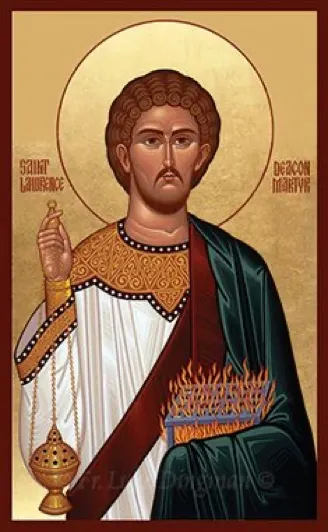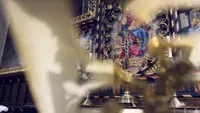Pew Sheet, Sunday the 10th of August 2025. 8th Sunday after Trinity / Feast of St Laurence

I suspect it may have something to do with my dog collar, but many people who do not usually attend church often start a conversation with me using the following words: ‘I do believe in God’… but then go on to justify their non-attendance by outlining the reasons they cannot, or will not do so. These often include being too busy, the presumed timing or length of services (or sermons), time commitments, a disapproving partner, or their not wishing to be in church with young children who, ‘should be seen and not heard’. Sometimes though, they tell me how someone (or something) connected with ‘the Church’ in the past has hurt or disappointed them so much that they no longer wish to attend it.
To be honest, I find many of the reasons given by those who ‘cannot’ come to church much harder to accept than those who ‘will not’, for often the latter’s stories of pain and hurt, disappointment or disengagement are more sincere and honest than those used by the former, and I even find myself agreeing with them from time to time, knowing that if I were in their shoes, I might feel the same way; and have done so in fact, when for almost ten years I avoided going to church altogether because of the condemnatory attitudes of some whom I had previously regarded as dear friends (and more than that, as my Christian brothers and sisters), when I decided I was too lonely to live on my own anymore, and those same people did not approve of that decision which they (though neither I nor the minister of my then church) believed to be sinful, and made me feel uncomfortable and unwelcome in a church I had served faithfully for many years.
Belief though, is not the same as faith, and therein lies the rub, for it is easy to believe in something without it ever making demands on your life. I believe in all sorts of things: freedom, equality, justice, fairness, liberty, peace, and forgiveness even, to such an extent that I have been called ‘woke’ by many inside and outside Church circles; not that this bothers me much, because Jesus ‘believed’ in them too, and it is better to be ridiculed for his sake than any other. At the end of the day however, even though my life and the lives of many others would be much the poorer in the absence of these things, I do not put my faith in them… I put it in God, because God is the one in whom all things hold together. Faith is much more than belief then. We can all believe in things without their being true, but the world would, I think, be a much better place if people acted on the basis of their faith rather than their beliefs at times, which may so easily be erroneous or unfounded, especially in this modern age, when we cannot necessarily believe everything that our eyes and ears tell us, and we can be deceived so easily by fake news or images made possible by so called ‘artificial intelligence’ algorithms.
People too can, and sometimes do, hurt and deceive us, even those whom we may have known for a long time, and in whom we have put our trust. But this is not an adequate reason for cynicism or to stop trusting and believing in one another. It is simply a reminder that we live in a fallen world where we are each capable of hurting others – without realising it sometimes, though the damage can be so much more acute when it is done deliberately. That is why Isaiah 1:16-17 (one of the alternative Old Testament readings for today) says, ‘wash yourselves and make yourselves clean; remove the evil of your doings from before my eyes, and cease to do evil. Learn to do good, seek justice, rescue the oppressed, defend the orphan and plead for the widow,’ for that is far more pleasing to God than any prayer or religious practice we might offer, and expresses our faith so much more powerfully than anything else we can do, together with forgiving those who trespass against us. We know that if we are faithful in this, God will redeem the years the locusts have eaten, and restore to us that which has been lost (Joel 2:25), even our faith in others.
Our other scripture readings today paint a picture of those whose lives are shaped by having a faith in what is promised by God and God alone, rather than what they have seen or experienced in the past. Abram trusted God for a son by Sarai even though she was much too old to bear children, and ‘it was credited to him as righteousness’. The son born of that promise, and Abram’s grandson also in turn, trusted God’s promise to create a great nation from Abram’s offspring, though none of them would live to see the result of that prophecy and arguably, neither have we, if we take seriously what Isaiah and Jeremiah tell us about the characteristics which that nation would embody and display to the world, for we have not seen them in all their fulness yet – but we will!
Belief is often shaped by what has happened to us in the past. Our beliefs are indelibly linked to those experiences, and our cognition and interpretation of them, so that they create a mental framework for reacting and responding to anything which happens to us subsequently. Faith however, is concerned with those things which have been promised and we hope for, though they have not yet been fulfilled. One anagram used to explain faith takes each letter of the word and explains it thus: Forsaking All I Trust Him, because there is only one we can ever truly trust, and who will never hurt or disappoint us: God himself, made visible in his Son Jesus Christ. Faith is forward looking, whereas belief looks backwards, and may even constrain us from imagining a better future. Faith too may be misguided if it is not placed in God, but in lesser things, or if the image of the God in whom we put our faith is an unhealthy or unhelpful one. This is why the Psalmist tells us not to trust in princes or in mortal man (Psalm 146:3), but to trust in God alone as the only true and reliable object of our ‘Faith’ with a capital ‘F’ (Psalm 62:5).
Faith without a capital ‘F’ also exists in the tension between a promise and its fulfilment in other ways, whether it is faith in a train company or airline to deliver us safely and on time to our destination, or a government to do all that it has promised. This is why we can be disappointed when we put all our faith in something or someone other than God. If however, we put our faith, our hope, and more importantly, our trust in the true object of faith, namely the one who is himself truly faithful, then we are less likely to be disappointed by the Church or anyone in it (or anything else for that matter!), and our faith becomes active rather than passive, for it hopes and dreams, and is always ready to be surprised by what God has in mind for us.
In today’s Gospel, Jesus makes clear that he expects us to wait patiently for him in faith, but to ready ourselves at the same time, just as a servant waits and prepares him or herself for their master’s return. We are bidden to wait in hopeful expectation even if our former experiences, and those whom we have trusted in the past have left us feeling let down, discouraged, anxious, disappointed, distrustful or cynical about the Church or other people, for as today’s Collect reminds us, we must trust in God alone. God as revealed in the person and teachings of Jesus Christ is the only true antidote to the hurt, disappointment, discouragement and despair which might otherwise cripple us, and our faith in God and other people going forwards. Let us wait then in faith, buoyed by hope, and trusting that God in his great goodness will indeed redeem the years that the locust has eaten!
Collect
Lord God, Your Son left the riches of heaven and became poor for our sake.
When we prosper, save us from pride, and when we are needy, save us from despair, that we may trust in you alone. Through Jesus Christ our Lord.
Genesis 15:1-6
After these things the word of the Lord came to Abram in a vision. ‘Do not be afraid, Abram, I am your shield; your reward shall be very great.’ But Abram said, ‘O Lord God, what will you give me, for I continue childless, and the heir of my house is Eliezer of Damascus?’ And Abram said, ‘You have given me no offspring, and so a slave born in my house is to be my heir.’ But the word of the Lord came to him, ‘This man shall not be your heir; no one but your very own issue shall be your heir.’ He brought him outside and said, ‘Look towards heaven and count the stars, if you are able to count them.’ Then he said to him, ‘So shall your descendants be.’ And he believed the Lord; and the Lord reckoned it to him as righteousness.
Hebrews 11:1-3; 8-16
Now faith is the assurance of things hoped for, and the conviction of things not seen. By faith our ancestors received approval. By faith we understand that the worlds were prepared by the word of God, so that what is seen was made from things that are not visible….
….. By faith Abraham obeyed when he was called to set out for a place that he was to receive as an inheritance; and he set out, not knowing where he was going. By faith he stayed for a time in the land he had been promised, as in a foreign land, living in tents, as did Isaac and Jacob, who were heirs with him of the same promise. For he looked forward to the city that has foundations, whose architect and builder is God. By faith he received power of procreation, even though he was too old, and Sarah herself was barren, because he considered him faithful who had promised. Therefore, from one person, and this one as good as dead, descendants were born, ‘as many as the stars of heaven, and as the innumerable grains of sand by the seashore.’
All of these died in faith without having received the promises, but from a distance they saw and greeted them. They confessed that they were strangers and foreigners on the earth, for people who speak in this way make it clear that they are seeking a homeland. If they had been thinking of the land that they had left behind, they would have had opportunity to return. But as it is, they desire a better country, that is, a heavenly one. Therefore, God is not ashamed to be called their God; indeed, he has prepared a city for them.
Luke 12:32-40
‘Do not be afraid, little flock, for it is your Father's good pleasure to give you the kingdom. Sell your possessions and give alms. Make purses for yourselves that do not wear out, an unfailing treasure in heaven, where no thief comes near and no moth destroys. For where your treasure is, there your heart will be also.
‘Be dressed for action and have your lamps lit; be like those who are waiting for their master to return from the wedding banquet, so that they may open the door for him as soon as he comes and knocks. Blessed are those slaves whom the master finds alert when he comes; truly I tell you, he will fasten his belt and have them sit down to eat, and he will come and serve them. If he comes during the middle of the night, or near dawn, and finds them so, blessed are those slaves.
‘But know this: if the owner of the house had known at what hour the thief was coming, he would not have let his house be broken into. You also must be ready, for the Son of Man is coming at an unexpected hour.’
Post Communion Prayer
Strengthen for service Lord, the hands that have taken holy things. May the ears which have heard your word be deaf to clamour and dispute. May togues which have sung your praise be free from deceit. May the eyes which have seen the tokens of your love shine with the light of hope. And may the bodies which have been fed with your body be refreshed with the fullness of your life. Glory to you forever.
Important Notice
Many of you will remember that Archdeacon Guy informed us at our Annual Parochial Church Meeting on the 19th of May this year, that Terry Capstick, our former honorary treasurer, was due to appear in court on the following day to answer two charges of fraudulently obtaining funds by deception. On the following Sunday, I reported that Terry had pleaded guilty to both charges at High Wycombe Magistrates court, and was subsequently bound over to appear before Aylesbury Crown Court for sentencing on Wednesday the 6th of August. It gives me no pleasure, and indeed, it is with great sadness, that I must tell you that having pleaded guilty to the offence of fraudulently obtaining £122,052.13 from the Rogers’ Educational Trust here in Winslow, and fraudulently obtaining £163,600.13 from the Parochial Church Council of St Laurence Church Winslow in the four-year period (2019 and 2023) covered by an investigation undertaken by Thames Valley Police, that Terry was given two four-year custodial prison sentences to run concurrently by the judge at that hearing last Wednesday.
We are enormously grateful for the work of Thames Valley Police and the Criminal Justice System for bringing this regrettable case to a conclusion. Fraud is a crime which has far reaching consequences, not least the financial viability of a parish or any other charity, and we are relieved to have the clarity and certainty we needed regarding the actions of our former honorary treasurer as we move forwards. We ask you to pray for the PCC, the parish, the trustees of the Rogers’ Educational Trust and our wider community as we recover from this difficult situation, and that the new team charged with managing our financial affairs will continue to bring their expertise to our church. We also pray for rehabilitation and healing for our former treasurer, and of course, for Barbara and all of Terry’s family members, who have been so indelibly impacted by his actions. May they find peace, comfort, and some degree of assurance as they come to terms with his sentence and the absence this entails; and for the healing of the enormous distress and sadness they naturally and inevitably feel at present.
I do want to assure you, that in making her judgement, the judge in charge of sentencing Terry took full account of his health status, and has ordered that he be remanded in custody to a prison close to a suitable hospital so that he may continue to receive the care that he needs. We do of course pray for his full and speedy recovery, and trust that he will be able to lead a full and fulfilling life after his rehabilitation and release from prison.
Next week’s activities:
Most of our usual midweek activities are taking a break in August and will resume next month, but please check with the churchwardens for more info.
Monday (Clare of Assisi, Founder of the Poor Clares, 1253)
Wednesday (Florence Nightingale, Nurse and Social Reformer, 1910)
Thursday (Maximilian Kolbe, Friar, Martyr, 1941)
Friday (The Blessed Virgin Mary)
CORRECTION
Tony Morley’s funeral will be at 1.30pm on Friday the 22nd of August and not Friday the 15th as announced in church last week.

O Glorious Saint Lawrence, Martyr and Deacon, who, being subjected to the most bitter torments, did not lose your faith nor your constancy in confessing Jesus Christ, obtain in like manner for us, such an active and solid faith, that we shall never be ashamed to be true followers of Jesus Christ, and fervent servants of Christ in word and in deed, in spite of trials, persecutions, or the sword.
Lord Jesus, we pray, that the flames of your Divine love may burn away all traces of vice within us, and that we may be practical and zealous in the service of the poor as he was.
O Generous patron of the Church’s poor, St. Lawrence, pray to the One God, Father, Son and Holy Spirit, that the poor in every corner of the world may feel the effect of the love of their brothers and sisters who seek to help them.
Deliver the Church from the greed and envy of the powerful, so that she may serve the needy in freedom, giving them every good thing for the benefit of their body, mind and soul.
May we come some day with all those whom we have helped on earth to the glorious mansion of heaven, and there enjoy the riches of God’s house, and the eternal company of our Saviour Jesus Christ, who lives and reigns forever and ever. Amen.

Pastoral Care: Phone 07305 271 148 or email [email protected]

